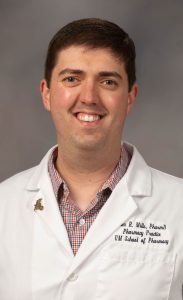JACKSON, Miss. – For many LGBTQ+ patients, finding proper health care can be difficult. A lack of expertise about issues they face, in addition to discrimination, means that many can go without treatment.
At the University of Mississippi Medical Center in Jackson, faculty are working to buck that trend and provide those needed services to patients.
Alex Mills, an assistant professor of pharmacy practice with the School of Pharmacy, is co-director of the Center for Gender and Sexual Minority Health at UMMC. The center is devoted to the health and well-being of LGBTQ+ individuals.

Pharmacy professor Alex Mills is co-director of the Center for Gender and Sexual Minority Health at the UM Medical Center. Submitted photo
Housed within the center is a Trustworthy, Evidence-Based, Affirming and Multidisciplinary, or TEAM, clinic, which provides critical care for LGBTQ+ patients. It is staffed by psychiatrists, psychologists, social workers, plastic surgeons and physicians. Mills serves as the clinic’s pharmacist, as well as director of clinical operations.
Among the services offered are primary care, gender affirmative medicine, HIV/STD screening and treatment and behavioral health services, including therapy and medication management.
Mental health disparities are a large threat to the LGBTQ+ community, Mills said. Patients, especially those who are transgender, are at higher risk of mental illness and suicide.
“Historically, there’s a lot of discrimination, isolation and harassment that a lot of these individuals experience, which we know, for a lot of them, can lead to psychological distress,” Mills said.
Since it can be difficult to access mental health services tailored to the needs of LGBTQ+ patients, the TEAM clinic has become a lifeline for them.
“I’ll talk to patients and ask how their experience in the clinic has been,” Mills said. “I’ve had several say to me, ‘This clinic has saved my life,’ and that just totally affirms everything I did for that entire week leading up to that clinic.”
The clinic also serves as an important educational resource. It serves as a training site for medical students and residents and teaches them to provide culturally competent care.
Mills pointed out that UMMC students and residents who participate in the clinic will be better prepared to treat all patients during their careers.
“I think that’s nice to be an educator beyond the classroom,” he said. “I’m educating future health care professionals and educating patients on how to take those medications.”
That work also benefits pharmacy students. Thanks to his work with the TEAM clinic, Mills can give them a perspective they might have otherwise not seen.
Seena Haines, chair of pharmacy practice, praised Mills’ work, saying that his training of new pharmacists will be beneficial to LGBTQ+ patients.
“This community, similar to other minority communities, needs a pharmacist clinician as part of the health care team to help address their specific needs,” Haines said. “By fostering connections through the education and training of students and residents, more practicing pharmacists, like Alex, will be patient advocates and attuned to the services needed by patients.”
The work of Mills and his team has not gone unnoticed.
Thanks to the work of the Center for Gender and Sexual Minority Health, UMMC was awarded “top performer” status by the Human Rights Campaign’s Healthcare Equality Index, which measures a health system’s commitment to care equality, particularly in LGBTQ+ patients. This is the highest such status that a health facility can receive.
Mills said that receiving this status validates the center’s work and serves as a symbol of progress and hope for patients.
“I think that the work that our center does and this designation as a top performer is just one initial step or beacon in the Southeast and Mississippi to help people feel respected as a person,” he said.
“It’s a great opportunity to very visibly show not only patients, but health care providers, future pharmacists and future health care leaders that this is a space where we are focused on treating everybody with the respect they deserve.”